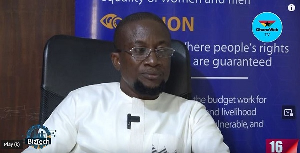Alhaji Amidu Sulemana, Upper West Regional Minister has called on political parties in Ghana to ensure that the welfare and empowerment of women featured prominently in their policies and programmes.
He said there was the need to support women's efforts with social development programmes that would benefit them and lessen their financial burdens.
Alhaji Sulemana was addressing women's groups, leaders of political parties and members of the physically challenged at the launch of the Election 2012 Peace Project in Wa on Friday.
The Project seeks to promote free, fair and peaceful elections and also assist women's groups to develop a regional women elections manifesto which would be used as a tool to set the agenda for issue based electioneering campaigns in the region.
Alhaji Sulemana said Ghanaian women were into all sectors of the economy, including agriculture, health, education, public service and trade but had always faced challenges of marginalization.
He said provisional results of the 2010 Population and Housing Census in Ghana put the percentage of women at 51.3 but the number of women in politics was not all that encouraging.
He noted that out of the 398 assembly members in the region, only 57 of them were women representing 14.3 per cent and called for more pragmatic policies and real actions to be taken towards gender equality in all spheres of life to enhance women’s livelihoods.
Alhaji Sulemana said government would continued to pursue policies and programmes to help improve the welfare of women and mentioned the free maternal care policy as one among others to deal with maternal and infant mortality.
He called for the elimination of all cultural, religious, legal and economic constraints that hindered the full participation of women in national development.
“Ghanaian women have to join hands in championing the cause of women. Women themselves who are the victims of injustices must become activists. They should not be passive, silent, submissive but should persevere until the necessary changes are made”, Alhaji Sulemana advised.
Alhaji Sulemana appealed to women in the region to come out in their numbers to register their names during the Biometric Voters Registration exercise on March 24.
“Do not allow false rumours making the rounds to deny you of your franchise and civic responsibility to register and vote in succeeding elections”, he said.
Madam Abiba Nibaradun, Coordinator of the Centre for the Promotion of Democratic Governance, called on Ghanaians not to be complacent about the democratic credentials and successes Ghana had chalked, but should take into consideration some of the political upheavals and conflicts that were going on in other parts of the sub-region as a warning to all.
She said the 2012 elections provided an opportunity for Ghanaians to prove to the world that the practice of multi-party democracy had come to stay with the people and all must be prepared to protect and defend the peace of the land.
Madam Nibaradun noted that democracy was truly exercised when the electorate were knowledgeable and well informed about options to enable them to make an informed choice.
She however expressed regret that many Ghanaians were living in deprived rural communities and were unaware of their civic and political rights.
Madam Nibaradun explained that women participation in the democratic process had been largely passive. "They vote mostly based on the dictates of their male counterparts rather than their own will and interest", she observed.**
Politics of Saturday, 24 March 2012
Source: GNA
















